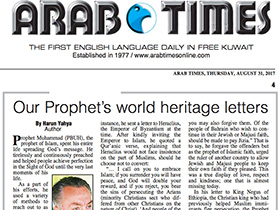
Prophet Muhammad (PBUH), the prophet of Islam, spent his entire life spreading God’s message. He tirelessly and continuously preached and helped people achieve perfection in the Sight of God until the very last moments of his life.
As a part of his efforts, he used a variety of methods to reach out to as many people as possible. One was sending out delegations of missionaries to the rulers of the powerful states of the time, an approach which marked the beginning of a new era in the history of Islam.
Today, we are extremely privileged to still have these letters because they not only provide valuable insight into his gentle nature and tireless efforts, but they also give great information about how Islam should be preached today: with peace and kindness. God clearly explains in the Holy Qur’an that there can be no compulsion in religion, that everyone has the right to make their own choices and that Muslims cannot and should not force anyone to be Muslims. Naturally, the Prophet displayed the epitome of this approach.
According to the Holy Qur’an, every Muslim has the duty of ”enjoining the right, and forbidding the wrong”. God makes it clear that this should be done only kindly and never forced. Indeed, God makes it clear that He does not like aggressors and says: ‘you are not there to force them. So remind with the Qur’an those who fear My warning.’ (Qur’an: 50/45)
This is exactly what Prophet Muhammad (PBUH), did. For instance, he sent a letter to Heraclius, the Emperor of Byzantium at the time. After kindly inviting the Emperor to Islam, he quoted a Qur’anic verse, explaining that Heraclius would not face insistence on the part of Muslims, should he choose not to convert:
“… I call on you to embrace Islam; if you surrender you will have peace, and God will double your reward, and if you reject, you bear the sins of persecuting the Arians (minority Christians sect who differed from other Christians on the nature of Christ). ‘And people of the scripture! Come to a word common to you and us that we worship none but God and that we associate nothing in worship with Him, and that none of us shall take others as Lords beside God. Then, if they turn away, say: Bear witness that we are Muslims.’”
There is one more very important point in this letter that begs careful consideration. With this letter, Prophet Muhammad (PBUH), was not only using considerate language in his invitation to Islam, he was also asking that the Christian minority, the Arians, be freed from persecution. It should be noted that at the time this letter was sent, the Byzantine Empire was one of the strongest states in the world with a formidable military. It is apparent that the Prophet risked his life to protect people in need, regardless of their faith. Similarly, in his letter to Muqawqis of Egypt, after kindly inviting the ruler to Islam, he asked him to end the persecution of Coptic Christians: “establish peace and you will have peace. God shall give you your reward two-fold. But if you decline then on you is the guilt of the Copts.”
His letter to the governor of Bahrain once again displayed his unwavering forgiveness: “I accept your recommendation regarding the people of Bahrain. I forgive the offenses of the offenders. Therefore, you may also forgive them. Of the people of Bahrain who wish to continue in their Jewish or Majusi faith, should be made to pay Jizia.” That is to say, he forgave the offenders but as the prophet of Islamic faith, urged the ruler of another country to allow Jewish and Majusi people to keep their own faith if they pleased. This was a true display of love, respect and kindness; one that is almost missing today.
In his letter to King Negus of Ethiopia, the Christian king who had previously helped Muslim immigrants flee persecution, the Prophet Muhammad (PBUH), kindly praised him and pointed at the common values between Islam and Christianity before inviting him to Islam.
“… peace be upon you, I thank God for you, The God, there is no God but Him, the King, the Holy, the Guardian, and I witness that Jesus, the son of Mary, is the Spirit of God and His Word. The Word He gave to the pure believer Mary, and from this Word she gave birth to Prophet Jesus. God made Prophet Jesus from His Spirit just as He made Adam from His hand. I invite you and your soldiers to believe in God the Almighty. I wrote and advised you, so accept my advice. Peace upon those who follow the right path.”
Indeed, in response to this letter, Negus embraced Islam. Many of the recipients of Prophet Muhammad’s (PBUH), letters, including Jayfar and Abd, the two princes of the powerful Azd tribe that ruled Oman, also welcomed Islam with open arms.
These letters express the Prophet’s unwavering determination to spread God’s message and show that he was always compassionate and never used force in his language when inviting others to Islam. As Muslims of today, we have a great deal to learn from his personality and we must show respect to those who have different faiths. Besides, we should always take the side of victims regardless of their identities. This is what God asks us to do.
Adnan Oktar's piece in Arab Times:
https://www.arabtimesonline.com/news/prophets-world-heritage-letters/


